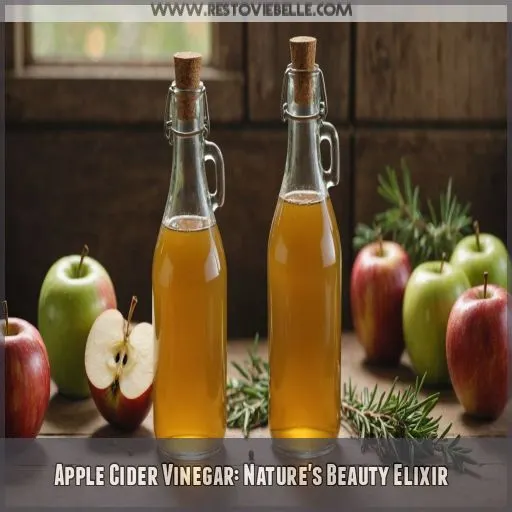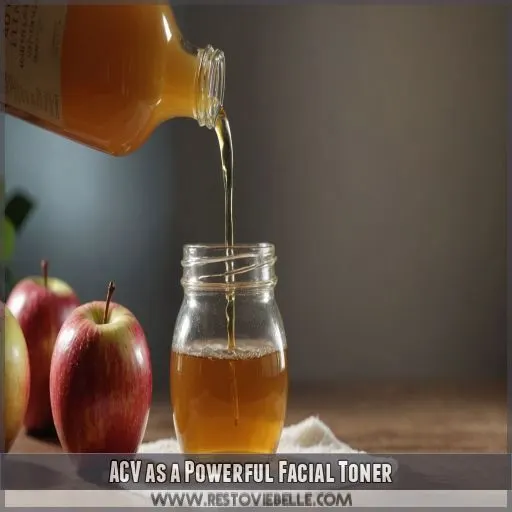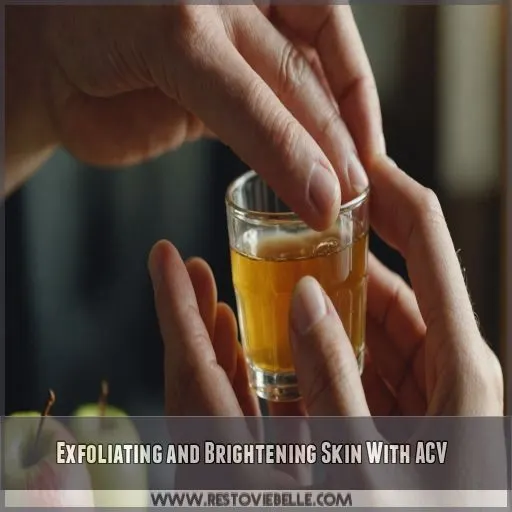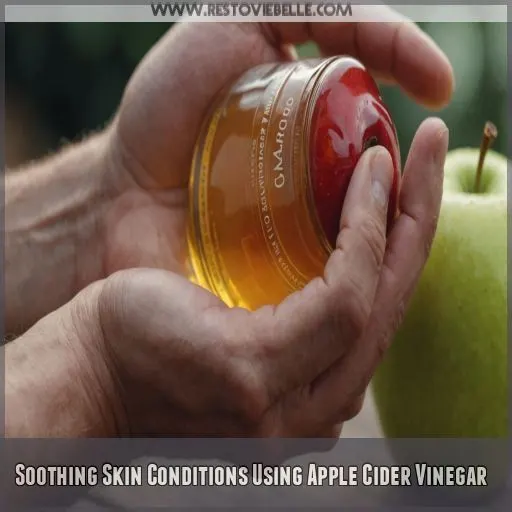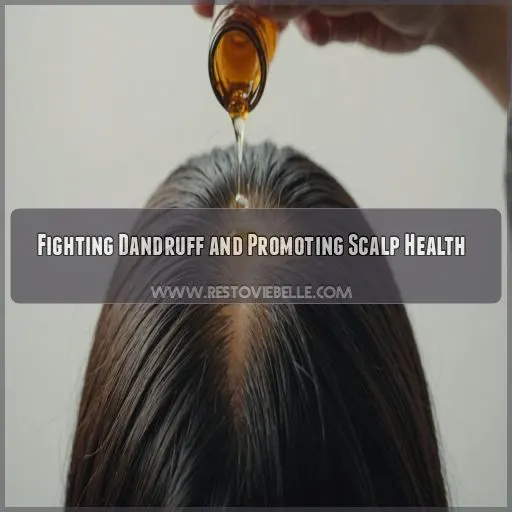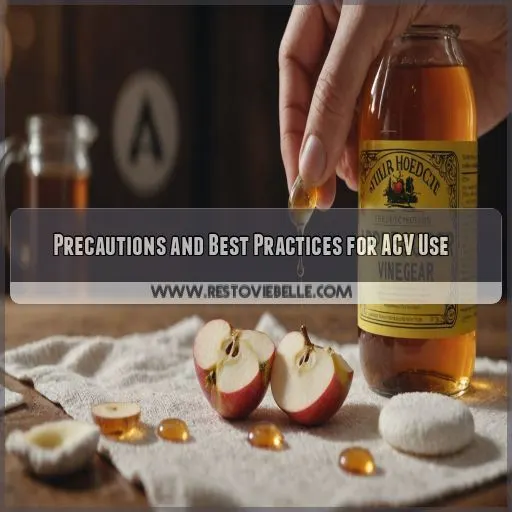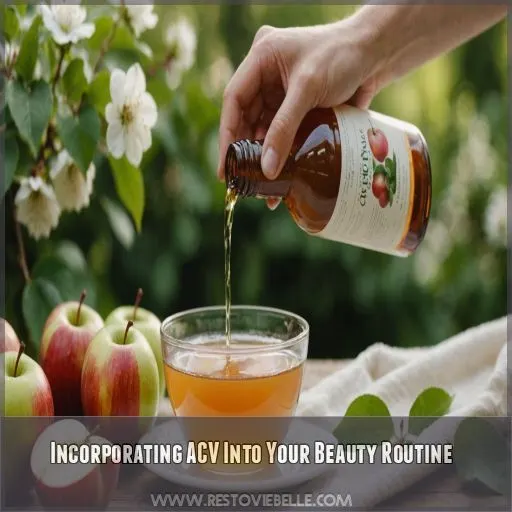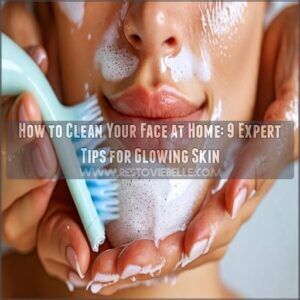This site is supported by our readers. We may earn a commission, at no cost to you, if you purchase through links.
 Apple cider vinegar (ACV) isn’t just for your salad dressing—it’s a beauty powerhouse for your skin and hair!
Apple cider vinegar (ACV) isn’t just for your salad dressing—it’s a beauty powerhouse for your skin and hair!
This tangy elixir can help balance your skin’s pH, fight acne-causing bacteria, and even minimize those pesky pores.
For your locks, ACV works wonders by removing product buildup and adding shine.
But don’t go splashing it on straight from the bottle!
You’ll want to dilute it first to avoid any "pickle face" mishaps.
From DIY toners to hair rinses, ACV’s versatility might just make it your new beauty BFF.
Ready to see what this pantry staple can do for you?
Let’s explore the benefits of ACV for beauty!
Table Of Contents
- Key Takeaways
- Apple Cider Vinegar: Nature’s Beauty Elixir
- ACV as a Powerful Facial Toner
- Exfoliating and Brightening Skin With ACV
- Soothing Skin Conditions Using Apple Cider Vinegar
- ACV Hair Rinse for Lustrous Locks
- Fighting Dandruff and Promoting Scalp Health
- Apple Cider Vinegar for Hair Growth
- ACV Beauty Treatments for Body Care
- Precautions and Best Practices for ACV Use
- Incorporating ACV Into Your Beauty Routine
- Frequently Asked Questions (FAQs)
- What is the use of apple cider vinegar for skin and hair?
- Can we apply apple cider vinegar directly on the face?
- What does washing your face with apple cider vinegar do?
- What does an apple cider vinegar bath do for females?
- Can ACV help reduce the appearance of cellulite?
- Is ACV effective for treating fungal nail infections?
- How does ACV compare to other natural beauty ingredients?
- Can ACV be used to lighten dark underarms?
- Does ACV have any anti-aging benefits for skin?
- Conclusion
Key Takeaways
- Apple cider vinegar (ACV) is a versatile beauty ingredient, great for both skin and hair care.
- It helps balance pH levels, fight acne, minimize pores, and enhance hair shine.
- ACV is a natural exfoliant and antibacterial agent, making it effective against skin issues like eczema, psoriasis, and dandruff.
- You can use ACV in toners, hair rinses, face masks, and even as a natural deodorant, but always dilute it first and do a patch test.
Apple Cider Vinegar: Nature’s Beauty Elixir
You’ve probably heard about apple cider vinegar’s health benefits, but did you know it’s also a powerhouse for your beauty routine? From balancing your skin’s pH to giving your hair a glossy shine, this natural elixir might just be the secret weapon your beauty arsenal’s been missing.
Chemical Composition of ACV
Ever wondered what makes ACV a beauty powerhouse? It’s all in the chemistry! During fermentation, apple juice transforms into a cocktail of beneficial compounds. Here’s what you’ll find in your bottle of liquid gold:
- Acetic acid: The star player, with antimicrobial superpowers
- Malic acid: Your skin’s brightening buddy
- Alpha hydroxy acids: Nature’s exfoliating wizards
- pH-balancing properties: Your skin’s harmony keeper
These components work together to give ACV its anti-inflammatory and skin-loving qualities. Ready to harness this natural beauty elixir?
Historical Use in Beauty Routines
Apple cider vinegar (ACV) isn’t just a trendy ingredient in today’s beauty routines.
It’s been a staple in ancient remedies and folklore for centuries.
Our ancestors swore by its skin-clearing and hair-beautifying powers.
From Cleopatra’s beauty rituals to grandma’s secret recipes, ACV has stood the test of time.
It’s like the little black dress of natural beauty – timeless and always in style!
Types of ACV for Beauty Purposes
- Raw, unfiltered ACV
- Organic ACV
- Filtered ACV
- Bragg’s ACV (a popular brand)
Each type has its perks, but raw and unfiltered ACVs are often the go-to for beauty buffs. They’re like nature’s little powerhouses, packed with potential benefits for your skin and hair. Just remember, not all ACVs are created equal!
Benefits of Raw, Unfiltered ACV
Both types of ACV have their merits, but raw, unfiltered ACV is the real MVP in your beauty arsenal.
It’s packed with the "mother," a cloudy mixture of beneficial bacteria and enzymes.
This powerhouse blend can work wonders for your skin and hair, offering a natural solution for various beauty woes.
Ready to harness nature’s goodness? Let’s explore some DIY recipes and home remedies using this liquid gold!
ACV as a Powerful Facial Toner
You’ve probably heard about apple cider vinegar’s health benefits, but did you know it can also work wonders for your skin? As a facial toner, ACV can balance your skin’s pH, fight acne, and even shrink those pesky pores – all while giving you a natural glow that’ll make your friends wonder what your secret is.
Balancing Skin PH Levels
Your skin’s pH is like a delicate dance, and apple cider vinegar (ACV) is the perfect partner to keep things in step.
This natural toner can help balance your skin’s acidity, giving you that Goldilocks-zone of "just right."
Start with a patch test and dilute it properly.
If you’re unsure, chat with a dermatologist – they’re the real pH pros!
Reducing Acne and Breakouts
Want to say goodbye to pesky pimples?
Apple cider vinegar (ACV) might be your new best friend!
Its natural antibacterial properties can help zap acne-causing bacteria.
Plus, it’s a whiz at balancing your skin’s pH.
Try this DIY toner: mix one part ACV with three parts water.
Dab it on those trouble spots with a cotton ball.
Your skin will thank you!
Minimizing Pores and Oil Production
Ever feel like your pores are playing hide-and-seek with your complexion?
Apple cider vinegar (ACV) can help!
It acts like a facial cleanser on steroids, tightening those pesky pores and putting the brakes on oil production.
While it’s not a miracle worker (sorry, no magic wands here!), ACV’s astringent properties can help you say goodbye to that unwanted shine.
Just remember, moderation is key!
DIY ACV Toner Recipes
Ready to whip up your own ACV toner? You’re in for a treat!
Mix 1 part ACV with 3 parts distilled water for a basic recipe.
Spice it up by adding witch hazel for extra astringency or a drop of lavender oil for a soothing touch.
Start with once-weekly use and listen to your skin.
It might just become your new best friend in the battle against razor bumps and oily skin.
Exfoliating and Brightening Skin With ACV
You’ve heard about ACV’s toning powers, but did you know it’s also a secret weapon for exfoliation and brightening? The alpha-hydroxy acids in apple cider vinegar can help slough off dead skin cells and fade dark spots, revealing a more radiant complexion.
ACV’s Alpha-hydroxy Acid Content
You’ve heard about ACV’s toning prowess, but did you know it’s also a natural exfoliant?
That’s right – ACV contains alpha-hydroxy acids (AHAs), which are skincare superstars.
These gentle acids work their magic by breaking down the "glue" that holds dead skin cells together.
It’s like giving your skin a fresh start, revealing a brighter, more radiant complexion underneath.
Ready to harness the power of AHAs?
Removing Dead Skin Cells
Ready to give your skin a fresh start?
ACV’s gentle exfoliation power can be your secret weapon against dead skin cells.
It’s like giving your face a mini-workout, encouraging cell renewal and revealing a brighter complexion.
But don’t go overboard – moderation is key!
Start with a diluted ACV solution once a week, especially if you’re dealing with winter dryness or sunburn.
Your skin will thank you for this natural, budget-friendly boost!
Fading Dark Spots and Hyperpigmentation
Now that you’ve sloughed off those dead skin cells, let’s tackle those pesky dark spots and hyperpigmentation.
ACV’s malic acid is your secret weapon here.
It’s like a gentle eraser for your skin, gradually fading those stubborn marks.
Whether it’s sun damage or age spots, ACV can help even out your skin tone by reducing melanin levels.
Just remember, patience is key – this isn’t an overnight miracle, but a natural remedy worth trying.
ACV Face Masks for Glowing Skin
Ready to give your skin a natural glow? ACV face masks are your ticket to radiant beauty. These DIY recipes harness the power of apple cider vinegar to exfoliate and brighten your complexion. Here’s why ACV is your skin’s new best friend:
- Gentle exfoliation from natural acids
- Balances skin pH for a healthier glow
- Fights acne-causing bacteria
- Fades dark spots over time
Soothing Skin Conditions Using Apple Cider Vinegar
You might be surprised to learn that apple cider vinegar can be a game-changer for various skin conditions. From soothing eczema and psoriasis to calming sunburns and managing dandruff, this versatile kitchen staple has some impressive tricks up its sleeve for skincare.
Treating Eczema and Psoriasis
Are you dealing with eczema or psoriasis?
It can be a real pain, right?
Apple cider vinegar might be your new best friend.
It’s natural acidity can help balance your skin’s pH, which could ease those pesky flare-ups.
Here’s a simple trick:
Mix a tablespoon of ACV with a cup of warm water and gently dab it on the affected areas.
But remember, everyone’s skin is different.
Always start with a patch test and consult your dermatologist if you’re unsure.
It’s not a cure-all, but it could be a game-changer for your skincare routine.
Relieving Sunburn and Skin Inflammation
Got a nasty sunburn? Apple cider vinegar might be your skin’s new best friend. This kitchen staple can help soothe inflamed skin and reduce redness. Here’s how ACV works its magic:
- Balances skin pH
- Reduces inflammation
- Promotes healing
- Provides cooling relief
Just mix equal parts ACV and cool water, then gently dab on affected areas. It’s like giving your sunburned skin a cool drink! Remember, though: always patch test first to avoid any unwanted surprises.
Managing Dandruff and Scalp Issues
Itchy scalp got you down? ACV is here to save the day!
This natural wonder can tackle dandruff and other scalp issues like a champ.
Its antifungal properties help keep those pesky flakes at bay, while balancing your scalp’s oil production.
Say goodbye to constant scratching and hello to a healthier, happier scalp.
Just remember, a little goes a long way – start with a diluted solution and let ACV work its magic!
Healing Minor Cuts and Bruises
Got a minor cut or bruise? ACV might be your new go-to remedy!
Its natural antibacterial properties can help keep wounds clean and promote healing.
Simply dilute ACV with water and dab it gently on the affected area.
But don’t go overboard – too much can sting!
ACV Hair Rinse for Lustrous Locks
Discover the transformative power of apple cider vinegar for your hair with a simple DIY rinse. You’ll be amazed at how this natural ingredient can remove product buildup, restore your hair’s pH balance, and leave your locks looking shinier and smoother than ever before.
Removing Product Buildup
Ready to bid farewell to product buildup?
Apple cider vinegar‘s your new BFF!
This natural wonder works like a charm to strip away stubborn residue that’s been weighing down your locks.
You’ll be amazed at how it transforms your hair texture, giving your scalp a breather and your tresses a shine boost.
Whip up a DIY rinse and watch the magic unfold – hello, lustrous locks!
Restoring Hair’s Natural PH
Your hair’s pH balance is really important for healthy locks, and ACV can be your secret weapon.
When you use harsh shampoos, your scalp’s natural balance gets thrown off.
Enter ACV – it’s like hitting the reset button for your hair.
A quick rinse with diluted ACV can bring your scalp back to its happy place, promoting overall hair health.
It’s nature’s way of saying, "You’ve got this!
Enhancing Shine and Smoothness
Ready to take your hair game up a notch?
ACV’s not just for balancing pH; it’s your ticket to silky, shiny locks.
Think of it as nature’s hair polish!
By smoothing down those pesky cuticles, ACV helps tame frizz and boost shine.
It’s like giving your hair a well-deserved spa day.
Say goodbye to dull, lifeless strands and hello to hair that turns heads!
Proper Dilution and Application Techniques
- Start with a 1:3 ratio (1 part ACV, 3 parts water)
- Adjust based on your hair’s needs
- Never use undiluted ACV (ouch!)
- Apply after shampooing, focusing on scalp and ends
Fighting Dandruff and Promoting Scalp Health
If you’re battling dandruff and an unhappy scalp, apple cider vinegar might be your new best friend. This natural remedy packs a punch against flakes and itchiness, while also helping to balance your scalp’s oil production for healthier, happier hair.
ACV’s Antifungal Properties
Apple cider vinegar (ACV) is a natural antifungal agent that can help fight dandruff.
It works by creating an environment that is unfavorable for fungi to thrive.
Think of it as a gentle bouncer, kicking out unwanted scalp guests.
This helps restore your scalp’s health, giving your head a mini spa day!
Balancing Scalp Oil Production
Is your scalp a bit of an oil slick?
Apple cider vinegar might be your new best friend.
This natural wonder can help regulate sebum production, keeping your scalp in check.
By restoring your scalp’s pH balance, ACV can combat excess oil without stripping your hair.
Try a diluted ACV rinse once a week – your scalp will thank you, and those pesky flakes might just wave goodbye!
Relieving Itchy Scalp
Is your scalp driving you nuts with constant itching?
Apple cider vinegar might be your ticket to sweet relief.
Its antimicrobial properties can tackle the underlying causes of itchiness, like fungal overgrowth.
Plus, ACV’s natural acidity helps restore your scalp’s pH balance, creating an environment where pesky microbes can’t thrive.
Say goodbye to that maddening itch and hello to a happier, healthier scalp!
Combining ACV With Essential Oils
Ready to take your ACV hair game up a notch?
Let’s spice things up with essential oils!
These fragrant powerhouses can amplify ACV’s benefits, turning your scalp into a dandruff-free zone.
Mix a few drops of tea tree, lavender, or rosemary oil into your ACV rinse for an extra punch.
Your hair will smell divine, and you’ll also be giving those pesky flakes the boot!
Apple Cider Vinegar for Hair Growth
If you’re dreaming of luscious locks, apple cider vinegar might be your hair’s new best friend. This natural wonder can potentially boost hair growth by improving scalp health and creating an ideal environment for your tresses to thrive.
Stimulating Blood Circulation to the Scalp
Want luscious locks? ACV might be your ticket to better hair growth! This kitchen staple can boost blood flow to your scalp, potentially kickstarting those dormant follicles. Here’s how it works:
- ACV’s acetic acid improves circulation
- Better blood flow means more nutrients for hair
- Increased oxygen delivery energizes follicles
Just mix ACV with water, massage into your scalp, and let the magic happen. Your hair might thank you later!
Unclogging Hair Follicles
Ready for a hair growth boost?
ACV isn’t just about circulation; it’s your follicle’s best friend too.
Think of it as a mini-plumber for your scalp, flushing out dirt and excess oil that can suffocate hair roots.
By keeping follicles clear, you’re giving your locks the breathing room they need to thrive.
It’s like opening the windows in a stuffy room – your hair will thank you!
Strengthening Hair Strands
Now that you’ve cleared those follicles, let’s talk about strengthening your hair strands. ACV’s magic doesn’t stop at the scalp! It can help fortify your locks from root to tip. Here’s how ACV works its wonders:
- Seals hair cuticles
- Reduces breakage
- Improves elasticity
- Enhances overall shine
Think of ACV as your hair’s personal trainer, whipping those strands into shape. With regular use, you’ll notice stronger, shinier hair that’s less prone to breakage and more likely to grow.
ACV and Biotin-rich Hair Masks
Ready to supercharge your hair growth? Combine ACV with biotin-rich ingredients for a power-packed hair mask. Mix 2 tablespoons of ACV with mashed avocado, egg yolk, and a dash of honey. Apply this nutrient-rich concoction to your scalp and hair, let it work its magic for 30 minutes, then rinse thoroughly. Your locks will thank you for this nourishing treat!
ACV Beauty Treatments for Body Care
You’ve mastered ACV for your face and hair, but did you know it’s a powerhouse for your body too? From softening rough feet to banishing body acne, apple cider vinegar’s got some tricks up its sleeve for head-to-toe beauty care.
ACV Foot Soaks for Soft Feet
Now, let’s talk about foot care with ACV! You’ve heard about its hair-boosting powers, but did you know it can work wonders for your feet too? Here’s how to pamper your tootsies with an ACV soak:
- Mix 1 cup ACV with warm water in a basin
- Soak feet for 15-20 minutes
- Gently scrub and rinse
Your feet will thank you for this soothing treat!
Treating Body Acne and Bacne
Got bacne? Apple cider vinegar (ACV) might be your new best friend.
It’s a natural remedy that can help zap those pesky pimples on your back and body.
To use it, mix equal parts ACV and water, then apply the solution to your skin with a cotton ball.
ACV’s antibacterial properties can help fight acne-causing bacteria, and its pH-balancing magic can help keep oil production in check.
Say goodbye to body breakouts!
Soothing Razor Bumps and Ingrown Hairs
- Calms inflammation with its antibacterial properties
- Exfoliates dead skin cells, freeing trapped hairs
- Balances skin pH, reducing redness and irritation
- Acts as a natural astringent, tightening pores
Mix equal parts ACV and water, apply with a cotton ball after shaving, and feel the relief!
ACV as a Natural Deodorant
Moving from razor bumps to another body care concern, let’s talk about ACV as a natural deodorant. You might be thinking, "Vinegar smell? No thanks!" But hear me out. ACV can be your pit’s best friend, tackling odor-causing bacteria without harsh chemicals. Here’s a quick breakdown:
| ACV Deodorant | Effectiveness | Usage Tips |
|---|---|---|
| Bacteria-fighting | High | Dilute 1:1 with water |
| Odor-neutralizing | Moderate | Apply with cotton ball |
| pH-balancing | High | Use after showering |
Precautions and Best Practices for ACV Use
While apple cider vinegar can work wonders for your skin and hair, it’s important to use it safely and effectively. Let’s explore the key precautions and best practices you’ll need to know before adding ACV to your beauty routine.
Proper Dilution Ratios
With ACV, less is more! Think of it as a potent potion that needs taming.
For facial toners, start with a 1:4 ratio of ACV to water.
For hair rinses, go for 1:2.
Feeling brave? Gradually increase the strength, but never use it undiluted.
Adjust based on your skin’s reaction and use it no more than 2-3 times a week.
Patch Testing for Sensitivity
Before slathering ACV all over, let’s play it safe with a patch test. It’s your skin’s way of saying, "Hey, is this stuff cool?" Here’s how to do it:
- Dab a small amount behind your ear
- Wait 24 hours, resisting the urge to peek
- Check for any angry red spots or itchiness
- If all’s clear, you’re good to go
- If not, time to find a new beauty bestie
Frequency of Use for Different Skin Types
Now that you’ve patch tested, let’s talk about how often to use ACV based on your skin type.
If you’ve got oily skin, you’re in luck! You can use ACV up to three times a week.
For dry or sensitive skin, once a week is plenty.
Combining ACV With Other Beauty Ingredients
Now that you’ve got the hang of using ACV solo, let’s spice things up!
You can mix ACV with other natural powerhouses for a beauty boost.
Try combining ACV with honey for a moisturizing face mask, or whip up an ACV and yogurt hair treatment.
For a deep cleanse, mix ACV with clay.
Just remember, less is more when experimenting with these combos!
Incorporating ACV Into Your Beauty Routine
Ready to harness the power of apple cider vinegar for your beauty routine? Let’s explore how you can incorporate this versatile ingredient into your daily, weekly, and monthly regimens for healthier skin and hair.
Daily, Weekly, and Monthly ACV Treatments
Ready to make ACV your beauty BFF? Here’s how to fit it into your routine without going overboard.
Daily: Splash on a diluted ACV toner after cleansing.
Weekly: Treat your hair to an ACV rinse for extra shine.
Monthly: Pamper yourself with an ACV face mask.
Storing and Preserving Homemade ACV Solutions
Now that you’ve mastered daily, weekly, and monthly ACV treatments, let’s talk about keeping your DIY solutions fresh. Proper storage is key to maintaining the potency of your ACV mixtures. Here are some tips to keep your homemade beauty elixirs in tip-top shape:
- Store diluted ACV solutions in dark glass bottles to protect from light
- Refrigerate to extend shelf life and prevent bacterial growth
- Label containers with mixture ratios and date prepared
- Use within 2-4 weeks for best results
Tracking Results and Adjusting Usage
Now that you’ve got your ACV solutions ready, it’s time to put them to work!
Keep a beauty journal to track changes and be patient – results may take weeks to show.
Consistency is key, so stick to your routine.
If something’s not working, don’t be afraid to tweak your ACV recipe.
Your skin’s unique, after all!
Frequently Asked Questions (FAQs)
What is the use of apple cider vinegar for skin and hair?
You’ve heard the buzz about ACV, right? Well, it’s not just for salads! You can use apple cider vinegar to balance your skin’s pH and clarify your hair. Just remember to dilute it first, and you’re good to go!
Can we apply apple cider vinegar directly on the face?
You shouldn’t apply apple cider vinegar directly to your face. It’s too acidic and can cause irritation or burns. Always dilute it first – try mixing one part ACV with three parts water for a safer experience.
What does washing your face with apple cider vinegar do?
Washing your face with diluted apple cider vinegar can balance your skin’s pH, potentially reducing oiliness and acne. It might also exfoliate and brighten your complexion. But don’t overdo it – you’re not pickling your face, after all!
What does an apple cider vinegar bath do for females?
You’ll feel like a fresh daisy after a dip in the tub. An ACV bath can balance your skin’s pH, soothe irritation, and tackle pesky odors. It might even give your lady parts a gentle cleanse.
Can ACV help reduce the appearance of cellulite?
You might’ve heard ACV can zap cellulite, but don’t get too excited. While it may temporarily tighten skin, there’s no solid proof it’ll banish those pesky dimples. Your best bet? A healthy lifestyle and targeted exercises.
Is ACV effective for treating fungal nail infections?
Wondering if ACV can conquer those pesky nail fungi? You’re not alone! While it’s touted as a natural remedy, the jury’s still out. ACV’s antifungal properties might help, but don’t ditch your doctor’s advice just yet.
How does ACV compare to other natural beauty ingredients?
ACV is a popular natural beauty ingredient, often compared to coconut oil. Both are affordable, multipurpose, and antibacterial. Depending on your needs, one might suit you better.
Can ACV be used to lighten dark underarms?
Some claim that apple cider vinegar can lighten dark underarms due to its acidity and mild bleaching effect. However, its efficacy isn’t proven. You can try applying it directly or mixing it with baking soda.
Does ACV have any anti-aging benefits for skin?
The beta carotene and anti-aging vitamins in ACV can reduce fine lines and age spots. ACV also contains alpha hydroxyl acids, which remove dead skin cells to reveal healthier, glowing skin.
Conclusion
So, is apple cider vinegar nature’s answer to all your beauty woes?
Well, not exactly. But it sure packs a punch when it comes to enhancing your skin and hair health. From exfoliating dead skin cells to soothing eczema and boosting hair growth, ACV is a versatile addition to your beauty routine. Remember, always dilute ACV before use, and patch test to make sure it suits your skin. Now go ahead and explore the beauty uses of apple cider vinegar for skin and hair!

